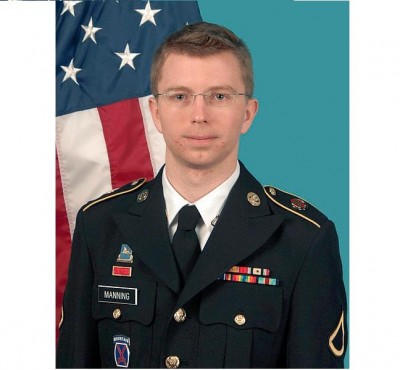Military Judge in Bradley Manning Court Martial Equates Exposure of State Secrets with Espionage

Last Thursday, the military judge who presided over the court martial of US Army Private First Class Bradley Manning issued ten pages of “special findings” in support of her verdicts on 19 counts against the 25-year-old whistle-blower.
Manning now faces a sentence of up to 90 years in a military prison for releasing to WikiLeaks a video recording showing US helicopter crewmen murdering Iraqis, along with hundreds of thousands of war logs and diplomatic writings detailing widespread conspiracies against people, organizations and governments throughout the world. Sentencing is due to be announced next week.
The defense asked Lind to provide reasons for the verdict on the counts for which Manning was found guilty. In response, she released a short document that largely repeats the military’s accusations with a declaration of agreement with the arguments. Manning, she found, released information that the government had declared classified, and this information was posted on the Internet. “The enemy” had access to the Internet, therefore Manning is guilty of espionage.
The same rationale employed by Lind could be used to prosecute anyone who releases any information that the government wants to be secret.
Completely absent from the court-martial findings is any recognition of Manning’s motives and of the importance the WikiLeaks’ revelations had for the population’s understanding of US government policy.
Nor does Lind make any finding that Manning caused any harm. Indeed, the only damage caused by Manning’s actions were to the machinations of the politicians and military officials whose war crimes he exposed.
Most of the findings are consumed with the small change of obedience to military regulations and whether Manning “purloined” and “converted” government property by making copies of it. In sustaining the most serious charge—“Causing Publication of Intelligence Belonging to the United States on the Internet Knowing the Intelligence is Accessible to the Enemy”—however, Lind defined “Intelligence” as “any information helpful to the enemy,” and “Enemy” as “not only organized opposing forces in time of war but also any other hostile body that our forces may be opposing and includes civilians as well members of military organizations.”
“Knowledge” requires, according to Lind’s ruling, only “that PFC Manning acted with actual knowledge that intelligence published on the internet was accessible to the enemy.”
In other words, anyone who releases to the general public information classified as secret by some US government agency can be charged with the equivalence of espionage because undefined “opposing forces” and even “civilians” can download it from the Internet. There is no requirement that the accused intended to benefit the so-called “enemy,” or that he was acting at the behest of a government or organization.
Lind’s findings ignore the First Amendment, and precedents such as the 1971 Supreme Court decision upholding the publication of the Pentagon Papers by the New York Times and Washington Post .
Explaining the dismissal of the government’s case to suppress the publication of classified documents revealing years of official lying about the United States intervention in Vietnam, Supreme Court Justice Hugo Black spelled out in that case that “for the first time in the 182 years since the founding of the Republic, the federal courts are asked to hold that the First Amendment does not mean what it says, but rather means that the Government can halt the publication of current news of vital importance to the people of this country.”
The Supreme Court ultimately upheld the right of the Times and the Post to publish the Pentagon Papers. Over the last 40 years, there has been a disintegration of any constituency within the ruling class for basic democratic conceptions.
Col. Lind’s ruling is geared not only at punishing Manning, but also at setting the stage for espionage prosecutions of WikiLeaks founder Julian Assange and NSA whistle-blower Edward Snowden—and anyone else who attempts to reveal government criminality.

